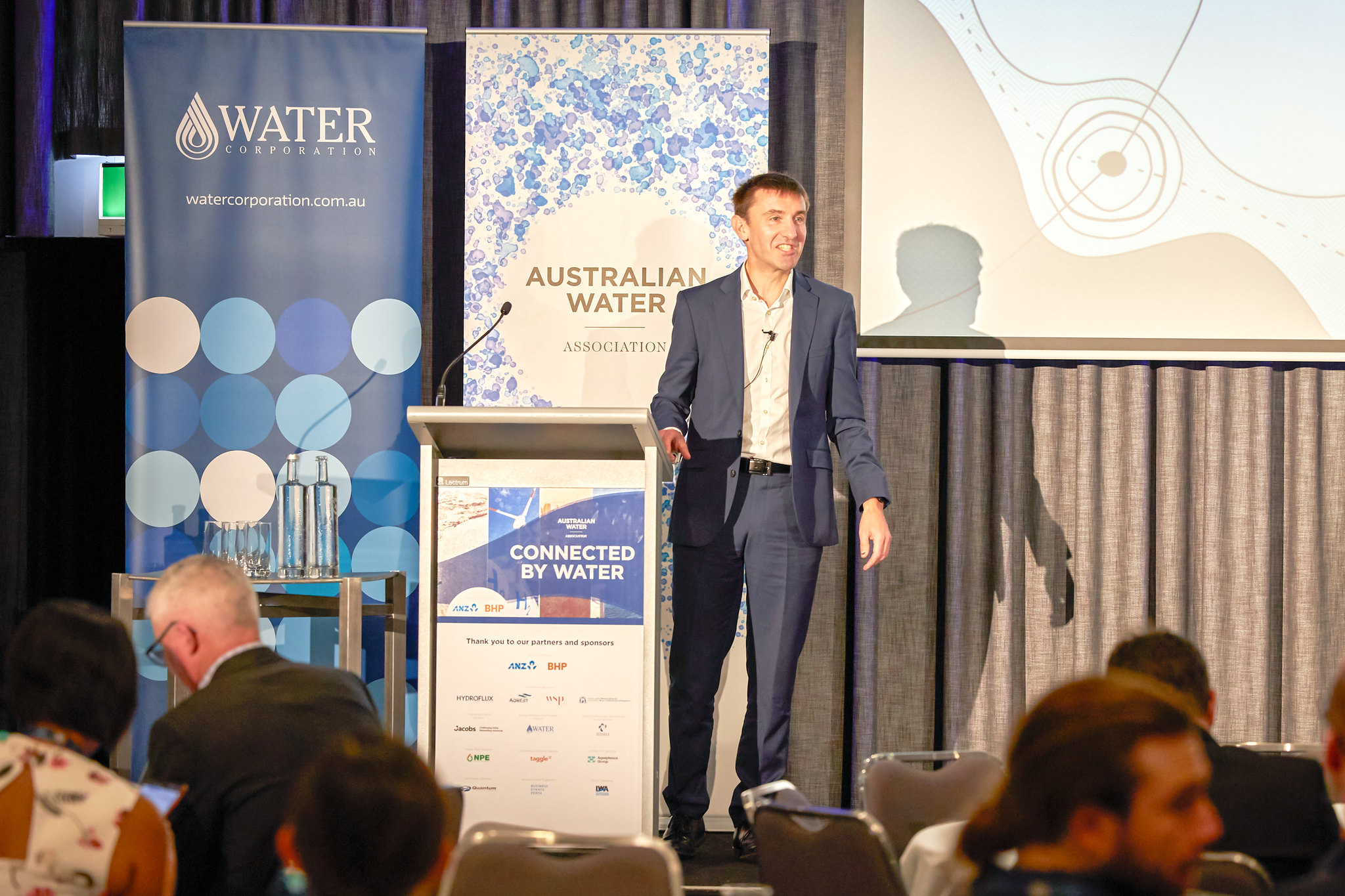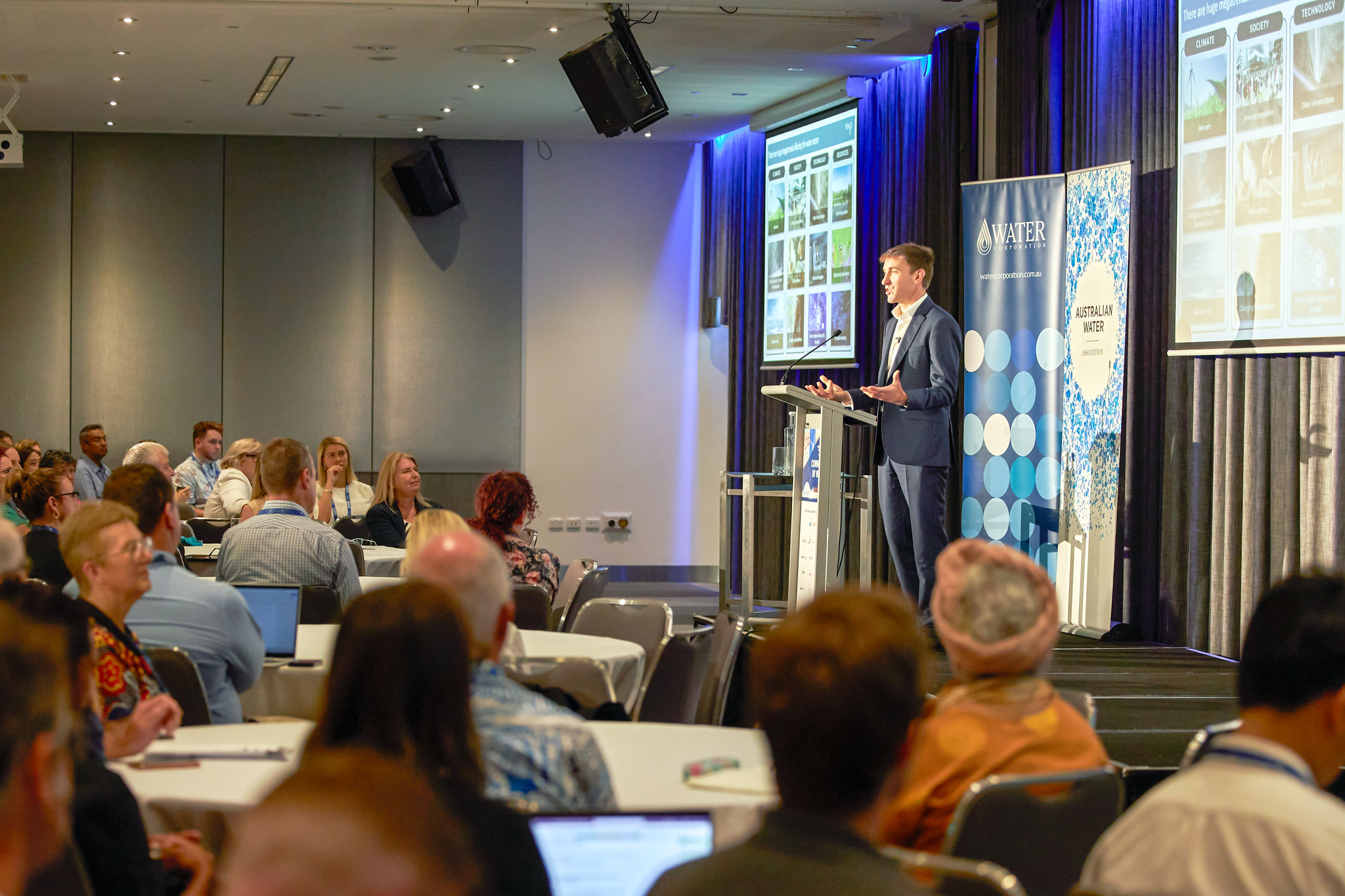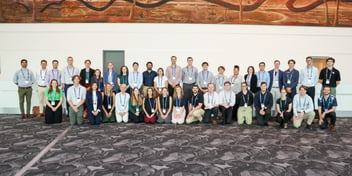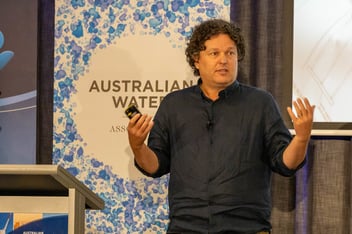FutureReady© Water – The Key Megatrends Affecting the Sector and the Opportunities to Innovate Faster

Kicking off the inaugural Connected by Water conference, keynote speaker David Symons presented the key megatrends affecting the water industry and how attendees could utilise the opportunities presented in these megatrends to create innovation at a faster pace.
Perth welcomed over 550+ delegates to the inaugural Connected by Water conference which began with a packed room of eager professionals across water, energy, mining and other sectors ready for a Keynote presentation by David Symons (Global Future Ready Innovation Lead and Director – Earth and Environment, WSP) who posed a question to the packed plenary room at the Perth Convention and Exhibition Centre.
"What are the key megatrends affecting the water industry?"
David proposed to the audience that when identifying a key megatrend, there is a need to consider three main points
- Recognition that the future is different to today and it’s difficult to think outside the present. Megatrends will affect everyone and we need to plan more on how to fix the present and the changing future.
- A purposeful plan is critical. Going beyond the typical 'pub convo' on how the future will be different and action needed from this. It is essential for everyone to have a purposeful plan on how to address the future. It's pivotal to walk the talk on megatrends.
- Individuals need to take on leadership to influence the gatekeepers of the future. Building influence may take time but it's crucial to be involved in the decision making process. Megatrends require action and new influence
With these three points in mind, WSP identified four key megatrends through the FutureReady™ Program.
What is FutureReady™?
FutureReady™ is WSP’s innovative approach to thinking beyond the conventional so that WSP can plan, design and deliver infrastructure that’s ready for today’s code and tomorrow’s challenges.
What are the megatrends?
Water infrastructure is here for the long term. As water professionals, we need to be aware of the four huge megatrends affecting the sector and wider areas including:
Megatrend #1 Climate
Climate change is expected to increase the risks to our natural and built environments. There will be more extreme weather events like bushfires, drought and floods. We will also experience increasingly drier conditions, hotter temperatures and rising sea levels.
Climate is not surprisingly a megatrend and we need to talk more on the trends that exist under this umbrella, not just extreme weather events.
Megatrend #2 Resources
What is a resource? The future availability of resources – particularly food, water and energy – is critically important to our prosperity. The circular economy, water scarcity, declining biodiversity and the role of renewables are key trends we need to consider.
More needs to be done to preserve water resources globally, in particular aquifers which have been declining by an average of 10cm each year. Biodiversity also needs more attention to reduce this decline and lastly a circular economy is borderline mandatory if we want to preserve existing resources and produce newer ones.
Megatrend #3 Technology
“If I talk to a digital audience, they will naturally say [Technology] is an important megatrend, but let’s recognise all challenges”. - David Symons.
Advances in technology are bringing about increased automation. Ubiquitous connectivity is transforming our expectations and the need for data transparency and trust.
Emerging technology will need to be onboarded quickly if we want to solve challenges that face old and existing infrastructure but on the flipside of the same coin, new technology poses newer threats in the cyber and security space. Improved frameworks for utilising technology will need to be developed concurrently with the advancements to reduce attacks from cyber criminals.
Megatrend #4 Society
Australia’s society is changing – the population is increasing and getting older. Our cities are densifying as a result. The Indigenous influence will be crucial to prepare for tomorrow. As the impact of COVID-19 evolves, we are looking at societal trends – are we seeing the rise of the neighbourhood?
A growing population exacerbates already existing issues with society, currently we are in a flat income structure on the precipice of an economic crisis. To fix issues with society, we need to change expectations to weather the economical storm.
These four megatrends outline the biggest issues facing the water sector, but can we do anything to innovate?
Yes, but we must not look for short term fixes for long term problems.
The long term plan
Long term plans are essential and it's critical to be clear about the performance, especially in the face of changing public perception.
“We need to acknowledge that public trust levels with water companies and utilities can drop due to any specific issue. What people want from water companies will change in the future [based on individual need] and we, as professionals in this room, need to prepare to rebuild trust when the going gets tough.” - David Symons.
Learning 1:
Set design standards ready for the long term
It is critical to be clear about the performance standard. We know the future is going to be different, let’s have a purposeful conversation with our companies, colleagues and stakeholders on setting designs and plans that are safeguarded for the long term.
Learning 2:
Draw on global solutions
There are lots of opportunities for innovations on a global scale through cross-learning opportunities with other companies, utilities, associations and organisations across both water and broader fields. Collaboration will be key to innovative solutions for these megatrends.
Learning 3:
Put customers at the heart of planning
Customers are the lifeblood of any business and it's important we factor customers in the planning stage for any project and solution.
Cambridge Water has been investigating how different religions use water in their Cambridge Interfaith Programme with a purpose to identify how different people use water and for what purposes, including religious and spiritual.

In 2006, Denver Water executed a clever display campaign addressing the importance of water conservancy with the tagline ‘use only what you need’ through installations and artwork provoking the public to think more about water conservancy from a different angle involving shortened park benches, billboards and more to illustrate their point.
Learning 4:
Have a plan – with strong governance for delivery
You cannot have a plan without airtight governance to deliver and execute said plan. One example was the work from WSP on the UK National Highways 2030/2040/2050 plan which outlined the complete reduction of emissions on national highways by 2050 in three different stages
- Corporate emissions
– net zero emissions for corporate by 2030 - Maintenance and Construction emissions
– Net zero emissions by 2040 - Road user emissions
– supporting zero carbon road travel by 2050
Where to from here?
Professionals across water will be the main drivers for change, but the global population can take steps immediately to reduce their water wastage. Long term planning will lead to long term solutions and exponential growth.
Let's make water sustainability the next megatrend.
Find out more on the inaugural Connected by Water conference including photo galleries and recaps.




